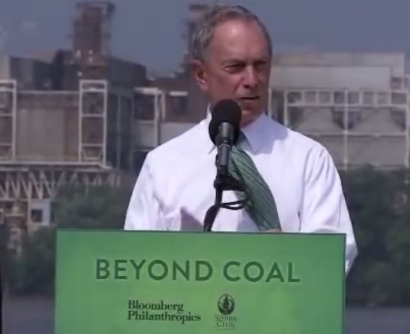
The billionaire media mogul unveiled his plans at the Washington, D.C. office of the Sierra Club.
His announcement comes a day after the Trump administration started the process of rolling back former President Barack Obama's Clean Power Plan, which had been a key part of the U.S. commitment to reduce greenhouse gas emissions as part of the Paris climate agreement.
“The war on coal is a fight for America’s health, for our economy and our environment, and our competitive place in the world," Bloomberg said. "And it’s a fight we’re going to win, no matter what anybody in Washington says.”
He added: “This is to save American lives and save the American economy. This is our future, and going in the wrong direction is just needlessly inflicting pain on all of us, and it has to stop.”
The funding includes $30 million to support the Sierra Club's Beyond Coal campaign through 2020 as well as funding for other groups like the League of Conservation Voters to help speed the transition to clean energy sources on the state and local level.
“These are the groups that are fighting the war on coal, and it’s happening all across America,” Bloomberg said.
The money will be distributed through his Bloomberg Philanthropies organization.
Bloomberg has been the main funder of the Beyond Coal campaign since it launched in 2011. His $30 million commitment is in addition to more than $100 million he has dedicated for the anti-coal project in the last six years.
The Sierra Club said that since it launched the program 259 coal-fired plants -- about half the U.S. total -- have shut down or committed to do so.
The group claims that the closures have reduced deaths related to coal pollution by 42 percent.
Bloomberg said his donation is intended to counter Trump’s pro-coal policies, including his doing away with the Clean Power Plan.
When President Obama introduced the plan in 2015, he said he wanted to reduce coal’s market share for electricity generation from 30 percent to 27 percent by 2030, and emissions from coal-fired plants by 32 percent.
But critics claimed the rules would hurt the already struggling coal industry and cost states like Kentucky and West Virginia, and successfully stymied the plan's implementation.
In August 2016, a Washington, D.C. appeals court enjoined federal agencies from enforcing the plan until various legal challenges to it could work their way through the courts.
Bloomberg said Wednesday that repealing the plan is a mistake, but "the truth of the matter is we’re already making great progress limiting carbon pollution from power plants, and we’re going to continue, keep doing it, without leadership from Washington."
He noted his collaboration with California Governor Jerry Brown on a state-based effort to meet targets in the Paris agreement with or without formal support from the Trump administration.
Later he said, "Whether you believe what scientists tell us about climate change or not, there's no debating that coal pollution is terrible for our health."
For additional information:

